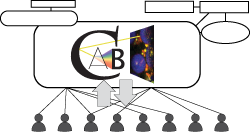About CAB
The core facility Center for Advanced Bioimaging (CAB) Denmark was inaugurated in June 2011, funded by the programme for National Research Infrastructure, based on a proposal which gathered more than 50 research groups from all over Denmark. In recent years, major modernization and upgrades have been funded by the Danish Ministry of Higher Education and Science governmental research infrastructure roadmap and the Novo Nordisk Foundation.
The center provides access and expertise in a large variety of light microscopy and electron microscopy imaging modalities, including sample preparation and ranging from routine to high-end equipment. We are part of a strong national (danishbioimaging.dk, dbi-infra.eu) and international (eurobioimaging.eu) bioimaging network. Users are offered training and support by full-time staff, and our philosophy is to educate all users to allow them to work independently. Special focus areas in the center are live imaging of cells and tissues as well as plants and, more recently, analytical imaging.
CAB is located at the Department of Plant and Environmental Sciences (Frederiksberg campus) and Department of Biology (North campus), Faculty of Science, University of Copenhagen. The center is open for external users from academia and industry.


